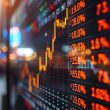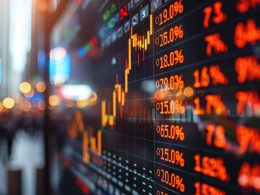Even More Signs Of A Possible Reversal In The Wealth Effect
by Jesse Felder, The Felder Report
“If you build a bridge it has to reach the other side. So I think a bridge that relies on wealth effects, you better hope that you got enough growth to justify the asset price increase which created the wealth effect in the first place. So there is some sort of virtuous cycle that gets kicked off which becomes self-fulfilling over time. The alternative is you kick off the wealth effect now, but over time people realize the wealth ain’t coming and then you have an asset price adjustment.” –Raghuram Rajan, current head of the Reserve Bank of India and former chief economist at the IMF
There is no doubt the Fed achieved its goal of boosting the prices of risk assets over the past several years. Whether the Fed was able to create a, “virtuous cycle,” of growth that validates the gains in stocks is another question entirely. From the looks of equity values relative to their earnings, I’d have to say it now appears that, just a Rajan suggested, “the wealth ain’t coming.”
Update: S&P vs Ebitda, 10yr normalized to 100. Reversion to mean is nasty. Bulls delusional https://t.co/Yq0llvnJeH pic.twitter.com/79IMkcTbTY
— JP Compson (@JPCompson) April 9, 2016
This is most evident in the recent fortunes of the most wealthy. CEO pay is falling at the fastest rate since the financial crisis. This is mainly because corporate earnings and profit margins are falling and the efforts of CEO’s and CFO’s aimed at engineering better financial results just aren’t enough to overcome these headwinds.
CEO Pay Last Year Shrank Most Since Financial Crisishttps://t.co/GuQU2F63MX pic.twitter.com/GYKOkKJbGQ
— Jesse Felder (@jessefelder) April 8, 2016
In addition to the public executive suite, it appears startup founders and their venture capitalist backers are feeling the heat from a broad shift in risk appetites.
VC funding falls 25% in Q1, largest decline since the dotcom bust https://t.co/ejVzqmqVMa pic.twitter.com/Y9NwdOFWk8
— Jesse Felder (@jessefelder) April 15, 2016
This doesn’t just affect Silicon Valley. Startup hotbeds in places like Seattle, Austin and others are even feeling more pain right now than the Bay Area.
Q1 startup funding was a "rollercoaster mostly pointed down" https://t.co/6T8INJKDZ6 pic.twitter.com/uf7nZHy01f
— Jesse Felder (@jessefelder) April 14, 2016
Still, Silicon Valley is the single largest startup market on the planet by far and the weakness there is already apparent in their real estate market.
San Francisco's Condo Bubble Is Burstinghttps://t.co/joBIkbY25Z pic.twitter.com/oL9qosMhNu
— Jesse Felder (@jessefelder) April 9, 2016
It’s not just the ultra-high-end of that real estate market that’s feeling pressured. Real estate prices broadly declined in San Francisco last month.
Home prices in San Francisco just fell for the first time in 4 years https://t.co/ZeWV80MjYh pic.twitter.com/YEqeaQ8MO8
— Business Insider (@businessinsider) April 14, 2016
On the other side of the country, the pressure on the wealthy is coming from troubles in investment banking. Like the troubles in VC, this is mainly due to a broad shift in risk appetites (mainly in the credit market’s unwillingness to fund deals).
2016 M&A withdrawals highest since ’07 (by deal value) https://t.co/sMlO76V2dm pic.twitter.com/9UgaPz8VRL
— Mamta Badkar (@mamtabadkar) April 6, 2016
It appears hedge fund managers are also feeling the pinch of waning risk appetites.
'Let them sell their summer homes': New York City pension dumps hedge funds https://t.co/tO9Q9Grx2q via @Reuters
— Amy Tennery (@amytennery) April 14, 2016
In a recent piece, I noted the weakness in market for real estate in the Hamptons as a direct result of this pressure on the wealth there. But it appears they may be selling their winter homes, too.
Miami real estate is melting down:https://t.co/dTCnVpnqOW
— Northy (@NorthmanTrader) April 14, 2016
Beyond real estate, there’s a common theme now of weakening sales across virtually every luxury retailer, as well. I recently wrote a bit about Sotheby’s issues. LVMH had a similarly rough first quarter.
LVMH first-quarter sales miss forecasts https://t.co/aQdL5WSmYP pic.twitter.com/0gSUSyyZzY
— Business of Fashion (@BoF) April 12, 2016
…as did Burberry.
Burberry shares plunge 7% on profit warning https://t.co/HMG2ExooHS
— Wall Street Journal (@WSJ) April 14, 2016
If the Fed’s theory regarding the wealth effect is correct the weakness at the very high-end that we are now seeing could be a very good leading economic indicator. And it might not take long to see this weakness, “trickle down.” In fact, it may already be apparent in auto sales. As a direct beneficiary of zero-percent interest rates, this has been a bright spot for the economy… until now.
Retail auto sales growth cooled in 1Q. Car makers can only rely on fleet, discounts so long https://t.co/5OFuqxs9MA pic.twitter.com/Yqnin0FfoT
— John Stoll (@johndstoll) April 18, 2016
Car makers now have so much inventory, both new and used, they are getting desperate to offload it.
Leases on used cars mark new high/low in American car loan shenanigans https://t.co/WShZ3sa4Tx pic.twitter.com/wD0xb7Oa3k
— Pedro da Costa (@pdacosta) April 12, 2016
Weakness in autos is also starting to show up in credit, which has underpinned the entire boom in the sector.
23.5% of all new car loans are subprime and delinquencies are rising.https://t.co/GDuNrup2SM
— Jesse Felder (@jessefelder) April 4, 2016
All in all it seems there is reason to worry about the consequences of the Fed-engineered wealth effect in recent years. If it is now unwinding, “an asset price adjustment,” as Rajan suggested, may now be looming.
Real stock prices relative to their (super) long-term trend: +77% pic.twitter.com/hxICBQsaHJ
— Jesse Felder (@jessefelder) April 2, 2016















